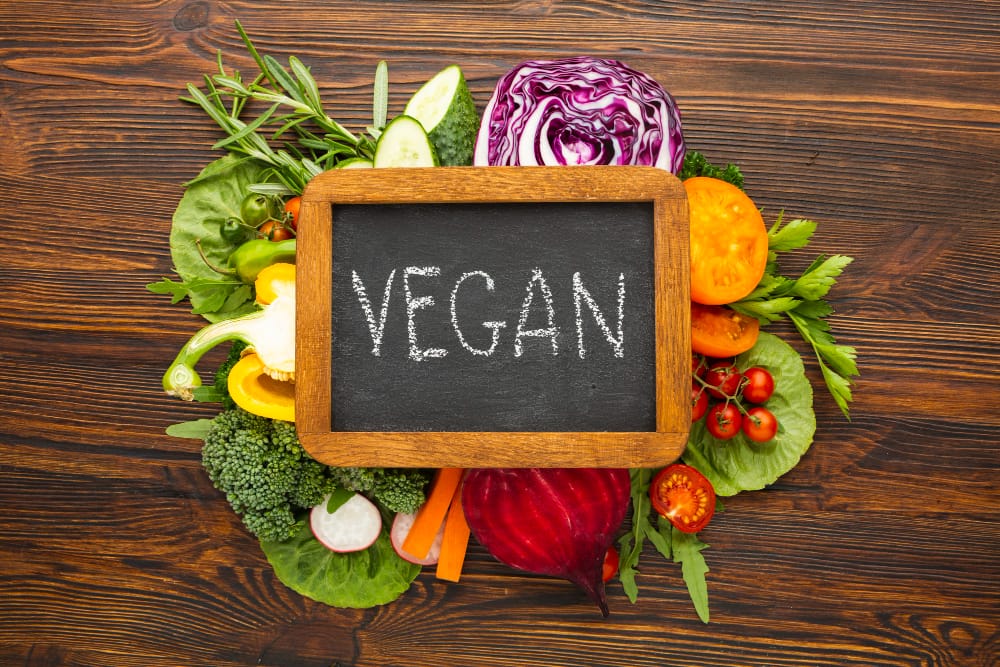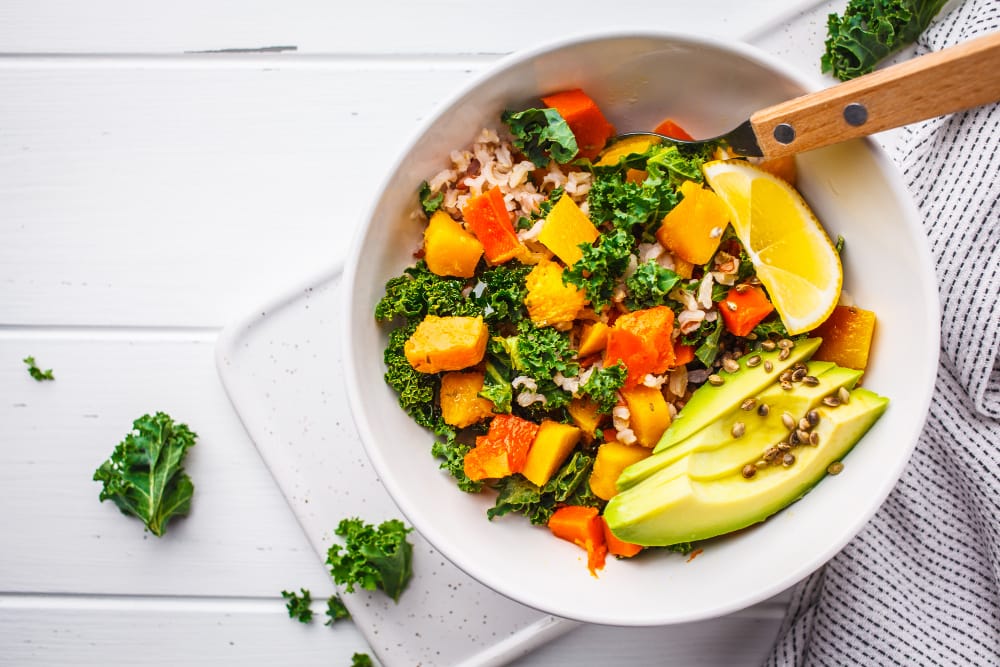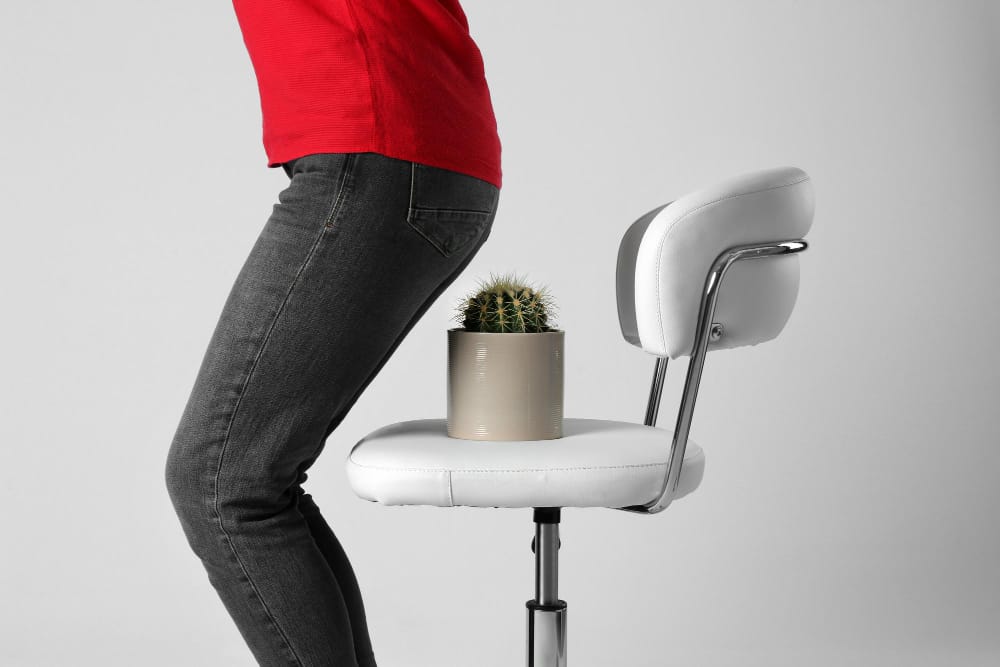When you’re grappling with the discomfort of anal fissures, the solution might not only be found in the medicine cabinet but also on your plate. There are specific vegan and plant-based diets for anal fissure patients also available that can help you with proper management and faster recovery.
Medical research has underscored the pivotal role of nutrition in the treatment and management of anal fissures, suggesting that what you eat can significantly affect your recovery trajectory. Dietitians are turning the spotlight onto the realm of vegan superfoods, which harbor a wealth of essential vitamins and minerals known to facilitate tissue repair and alleviate pain associated with anal fissures.
Moreover, esteemed health journals unanimously encourage a balanced diet teeming with plant-based healing foods to not only mend fissures but also enhance overall digestive health.
Vegan And Plant-Based Diets For Anal Fissure: Quick Overview
- Discover how a plant-based diet can contribute to the healing of anal fissures through gentle nutrition and effective protein sources.
- Learn about the anti-inflammatory and easy-to-digest nature of plant proteins, easing symptoms and promoting healing.
- Examine how dietary fiber from plant-based proteins may lead to softer stools and less straining, a significant benefit for those with anal fissures.
- Understand the relationship between protein intake and tissue repair and how vegan proteins can support your recovery.
- Exploring the specific vitamins and minerals in vegan superfoods that promote tissue repair and pain relief.
- Recognizing the comprehensive benefits of a plant-based diet for not just anal fissure recovery but also for overall digestive well-being.
- Discovering actionable dietary tips and remedies to incorporate into your daily routine for healthier anal tissue.

The Role of Nutrition in Anal Fissure Healing
Diet may hold a powerful key to unlocking the soothing relief that one seeks in the battle against anal fissures. It’s not only about the immediate alleviation from discomfort; it’s about nurturing the body with the resources it needs to self-repair.
A closer look at the medical literature reveals that a purposeful diet enriched with specific nutrients can substantially influence the outcomes of anal fissure treatment.
A diet rich in dietary fiber can soften stools, while adequate protein and tissue repair mechanisms are key to recovery.
Delving into this under-appreciated facet of gut wellness, the connection between natural remedies and recovery is both evident and compelling.
The Role of Plant-Based Diet in Managing Anal Fissures
Nutrition plays an integral part in the management of anal fissures. A balanced diet, particularly one centering around nutrition and anal health, can help alleviate symptoms and prevent recurrence.
Clinical research connects effective management of lower gastrointestinal (GI) tract diseases, including anal fissures, with specific nutritional interventions—chief among them being the incorporation of dietary fiber to ensure softer stools and reduce straining.
Incorporating Fiber-Rich Foods into Your Recovery Diet
Embarking on the healing journey from anal fissures, you’ll find a high-fiber vegan diet to be a formidable ally. Fiber is renowned for its role in promoting bowel health and fostering gentle digestion, qualities imperative for mitigating anal fissure discomfort.
Integrating fiber into meals not only supports a resilient digestive system but also lessens the strain during bowel movements—critical for your recovery.
Benefits of a High-Fiber Diet for Digestive Wellness
Research reveals a robust connection between dietary fiber and enhanced digestive function. A steady intake of fiber keeps bowel movements regular and can significantly reduce the pressure exerted during defecation, which is particularly beneficial for those recovering from anal fissures.
This gentleness on the digestive tract is pivotal for lessening pain and encouraging a faster healing process.
Top Vegan Sources of Soluble and Insoluble Fiber
To guide you toward a smooth recovery, dietary experts suggest incorporating rich sources of both soluble and insoluble fiber, which work in tandem to ensure well-balanced gut flora and efficient nutrient absorption.
Here’s a table that highlights a variety of vegan foods that are not only high in fiber but also help with gentle digestion and bolster overall bowel health:
| Soluble Fiber Sources | Insoluble Fiber Sources |
| Legumes (lentils, beans) | Whole grains (barley, bran) |
| Apples | Leafy greens (kale, spinach) |
| Oats | Root vegetables (carrots, potatoes) |
| Flaxseeds | Seeds & nuts (almonds, sunflower seeds) |
| Psyllium husk | Fruit skins (apple, pear) |
| Pectin-rich fruits (pears, oranges) | Cruciferous vegetables (broccoli, cauliflower) |
The inclusion of these fiber sources in your diet can play a substantial role in not only managing symptoms associated with anal fissures but also establishing a foundation for long-term digestive wellness.
A high-fiber vegan diet, replete with an abundant variety of fruits, vegetables, and whole grains, sets the stage for a path to gentle digestion and robust health.

Top Vegan Superfoods for Anal Fissures
As part of a natural approach to healing anal fissures, the inclusion of certain vegan superfoods can play a crucial role. These nutrient-dense foods cater not just to general health but specifically target the reduction of dietary inflammation and support faster recovery.
Nutritional research extols the virtues of plant-based foods rich in antioxidants and omega-3 fatty acids, critical components of a tissue-healing diet.
Antioxidant-Packed Berries and Fruits
Berries such as blueberries, strawberries, and raspberries are celebrated for their high antioxidant content. These scrumptious fruits help fend off oxidative stress on the body and reduce inflammation, which is vital for healing anal fissures.
The antioxidants present in these berries have been associated with faster recovery and reduced discomfort.
Seeds and Nuts Full of Omega-3
Omega-3 fatty acids, found in abundance in seeds and nuts like flaxseeds, chia seeds, and walnuts, contribute significantly to the reduction of dietary inflammation.
Their role in promoting tissue health is critical for those suffering from acute anal fissures. Regular consumption of these foods can support the body’s natural healing processes.
Healing Greens and Leafy Vegetables
Green leafy vegetables, such as spinach and kale, along with cruciferous counterparts like broccoli and Brussels sprouts, are packed with essential nutrients.
Their contribution to digestive tract healing is well-documented, offering a wealth of vitamins and minerals to aid in your recovery from anal fissures. Consuming a variety of these vegetables ensures a diet full of powerful, inflammation-fighting properties.
Integrating these vegan superfoods into your diet not only assists in the healing of anal fissures but also fortifies your overall health. Here’s a table to help you identify some key foods to include in your recovery diet:
| Category | Superfoods | Healing Properties |
| Antioxidant-Rich Fruits | Berries, Acai, Pomegranates | Inflammation reduction, cell repair |
| Omega-3 Seeds and Nuts | Flaxseeds, Chia Seeds, Walnuts | Dietary inflammation reduction, tissue health |
| Greens and Cruciferous Vegetables | Kale, Broccoli, Cauliflower | Nutrient supply, digestive support |
Making these foods a regular part of your diet has the potential to offer substantial relief and aid in the healing process of anal fissures.
Coupled with hydration and a balanced diet, these superfoods underscore the therapeutic power of a thoughtfully curated vegan diet.

Why Protein Is Critical for Anal Fissure Healing?
Proteins are the building blocks for repairing bodily tissues, making them indispensable in healing anal fissures. Their role in promoting protein and tissue repair processes is well-documented in nutritional journals.
It is vital, therefore, to consume sufficient quantities of protein that support cellular regeneration and tissue strength. For patients dealing with anal fissures, the right kind of proteins can be both therapeutic and a bulwark against future issues.
| Nutrient | Function | Dietary Sources |
| Protein | Tissue repair and regeneration | Legumes, nuts, seeds, tofu |
| Dietary Fiber | Soften stools, reduce straining | Whole grains, fruits, vegetables |
| Water and Fluids | Hydration, stool consistency | Water, herbal teas, broths |
Adopting a holistic approach to anal health that includes careful attention to both diet and lifestyle choices can make a significant difference to those suffering from anal fissures.
With an informed understanding of the contributing factors and the potential of nutrients to promote healing, a path to recovery and comfort is indeed possible.
The Benefits of Plant-Based Protein for Anal Fissures
Embarking on the journey of plant-based healing for anal fissures, you’ll find a gentler path that fosters recovery and soothes discomfort. With the spotlight on fiber-rich proteins, anti-inflammatory diets, and easy-to-digest proteins, you’re ushered into a realm where nutrition thoughtfully aligns with healing.
Recognized for their minimal irritation, plant-based proteins stand out for their ability to ease the digestive process—a pivotal benefit for those experiencing the pain of anal fissures. The inherent properties of these proteins have the potential to assuage inflammation, thereby reducing associated symptoms and accelerating healing.
Regular inclusion of foods like beans, chia seeds, and hemp hearts can lead to softer stools, making the dreaded act of passage less strenuous.
Certified dietitians advocate for the significant advantage provided by plant-based proteins, not just for overall well-being but also for specialized dietary management in gastrointestinal conditions such as anal fissures.
A shift towards a more plant-centric diet could mean a reduction in inflammation and a more comfortable healing journey.
Research supports this notion by highlighting the anti-inflammatory effects plant-based diets harbor. Commendable for their rich array of antioxidants, these diets can mitigate inflammatory responses within the body, offering reprieve during times of distress from anal fissures.
It’s also worth noting the relative ease with which your body can assimilate these easy-to-digest proteins compared to their animal-derived equivalents.
Replacing heavy, slow-to-digest meats with quinoa, lentils, or spirulina can lead to significant improvements, digestively speaking, making your recovery as comfortable as possible.
| Plant-Based Protein | Benefits for Anal Fissures |
| Beans and Legumes | Rich in fiber, promotes soft stools |
| Nuts and Seeds | Omega-3s and antioxidants help reduce inflammation |
| Whole Grains | Complex carbohydrates for sustained energy, less irritative |
| Leafy Greens | Mineral-rich, contributes to overall digestive health |
| Soy Products (Tofu, Tempeh) | Complete protein profile, high digestibility |
As you consider the incorporation of plant-based protein into your diet, remember the symbiotic relationship between nutrition and recovery.
Choose proteins that not only champion healing but also align with a lifestyle that cherishes gentleness and balance. The quest for relief from anal fissures need not be an ordeal when nature’s bounty offers nourishment with such profound grace.

Top Plant-Based Proteins for Optimal Healing
For individuals dealing with anal fissures, incorporating high-protein vegan foods is crucial for tissue repair and recovery.
Not only do plant-based proteins offer nutrient-dense nourishment, but they also provide complete amino acid profiles essential for the body’s healing processes. Let’s explore some of the best vegan protein sources ideal for your health journey.
Lentils and Legumes
Lentils and other legumes are staples in the world of nutrient-dense plant foods, known for their rich protein content and high fiber levels. Their role in a recovery diet is significant, providing the necessary proteins that contribute to the repair of tissues while ensuring digestive ease.
This is particularly beneficial for those with chronic anal fissures, as softer stools can be achieved, easing defecation and reducing the chance of further tearing.
Quinoa: A Complete Protein Source
Quinoa is a unique and powerful option for those seeking vegan foods that do not compromise on the provision of a complete amino acid profile. This grain, often mistakenly categorized as a cereal, contains all nine essential amino acids.
It is particularly suitable for a recovery diet following issues like anal fissures due to its high protein quality and versatility in dishes.
Nuts and Seeds: Nutrient-Dense Options
Nuts and seeds are more than just snacks; they are compact reservoirs of nutrition, loaded with proteins, healthy fats, and an array of vitamins and minerals that support the body’s healing functions.
The inclusion of almonds, walnuts, chia seeds, and flaxseeds in your diet introduces a healthy dose of omega-3 fatty acids, which aid in managing inflammation and promoting a smoother recovery from anal fissures.
| Food | Protein (per 100g) | Fiber (per 100g) | Key Nutrients |
| Lentils | 9g | 8g | Iron, Folate, Manganese |
| Quinoa | 14g | 7g | Magnesium, Phosphorus, Manganese |
| Almonds | 21g | 12.5g | Vitamin E, Magnesium, Calcium |
| Chia seeds | 17g | 34g | Omega-3 Fatty Acids, Calcium, Phosphorus |
These foods are more than just high-protein vegan foods; they represent healing companions on your path to recovery.
By choosing lentils, quinoa, and a mix of nuts and seeds, you’re not just satisfying your daily protein needs but also supporting your body’s natural healing process in a condition as delicate as anal fissures.

Plant-Based Diets For Anal Fissure: Complete Meal Planning
Designing a meal plan rich in plant-based proteins is a comforting and effective way to promote healing if you’re grappling with anal fissures.
The right nutrients not only support tissue repair but also ensure your meals are scrumptious and nurturing. Immerse yourself in a collection of protein-rich breakfast recipes, inventive vegan lunch and dinner ideas, along with healing snacks and smoothies, all thoughtfully curated to support your well-being.
Breakfast Ideas
Jumpstart your day with breakfast recipes that are both protein-dense and gentle on your digestive system. Begin with a bowl of oatmeal spiked with almond butter and sprinkled with hemp seeds for a comforting and nutritious start.
- Mix chia seeds into your morning smoothie for an easy, protein-rich drink.
- Prepare a tofu scramble, incorporating spinach and mushrooms for extra fiber and nutrients.
- Layer a parfait with vegan yogurt, granola, and a medley of berries to enjoy a delightful and protein-packed breakfast.
Lunch and Dinner Recipes
For lunch and dinner, explore vegan recipes that focus on filling, fiber-rich components to foster smooth digestion and efficient healing. Sate your appetite with these satisfying dishes:
| Meal | Key Ingredients | Protein Highlights |
| Lunch: Rainbow Quinoa Salad | Quinoa, black beans, red bell peppers, avocado, cilantro | Quinoa and black beans team up to form a complete protein source. |
| Dinner: Lentil Stew | Green lentils, carrots, tomatoes, kale | Lentils serve as a powerful protein provider for healing and recovery. |
| Dinner: Stuffed Bell Peppers | Bell peppers, brown rice, chickpeas, cashew cheese | Chickpeas offer both protein and fiber, ensuring a hearty, wholesome meal. |
Snacks and Smoothies for Healing
Between meals, reach for snacks and smoothies that are as healing as they are delicious. Here are some powerful options to nourish your body and aid your recovery:
- Blend a green healing smoothie with spinach, kiwi, banana, and plant-based protein powder.
- Snack on roasted chickpeas or edamame for a crunchy, protein-filled treat.
- Sip a soothing berry smoothie with a scoop of pea protein to restore energy and provide essential amino acids.
Embrace these healing snacks and smoothies as you navigate through your recovery. They’re not only simple to assemble but teem with the essential proteins and nutrients you need for optimum healing.
Common Concerns About Plant-Based Diets For Anal Fissure: Protein Quality and Quantity
When contemplating a switch to a plant-based diet, particularly for individuals coping with anal fissures, questions often arise about protein quality and quantity, as well as the overall impact on digestive health.
It’s crucial to navigate these risk factors with accurate information and reassurance regarding the benefits and practicality of plant-based protein sources.
The complete protein myth often perpetuates the view that plant-based proteins are inferior to animal-derived ones. However, this misconception has been debunked by numerous dietetic associations.
They highlight that a variety of plant foods can provide a sufficient protein intake, ensuring that your body receives all essential amino acids. For those healing from anal fissures, consuming an adequate amount of high-quality protein is critical.
Plant proteins like quinoa, soy products, and a mix of beans and rice serve as excellent sources that rival the complete amino acid profiles found in meats and dairy.
Final Note From Dr. Rajarshi Mitra
Transitioning to plant-based diets for anal fissure additionally brings consideration to digestive-friendly proteins which can be gentler on the system than their animal counterparts. One should be attentive to adapting fiber intake, as a sudden increase can lead to discomfort for some.
Gastrointestinal health can benefit greatly from a balanced consumption of digestive-friendly proteins, combined with a mindful approach towards integrating fiber-rich foods. It’s advisable to gradually increase your intake of legumes, whole grains, and nuts, allowing the digestive system time to adjust.
In time, this can alleviate concerns with digestion, ultimately contributing to a soothing nutrient flow that aids in the recovery from anal fissures.
FAQs
Can adopting a plant-based diet impact the recovery from anal fissures?
Yes, a plant-based diet can be beneficial for recovery from anal fissures. The high fiber content in plant-based proteins can aid in creating softer stools, reducing straining during bowel movements, and plant-based diets have anti-inflammatory properties that may reduce discomfort.
Can plant-based diets provide enough protein to meet daily nutritional needs?
Absolutely, plant-based diets can provide sufficient protein to meet daily nutritional needs. By consuming a variety of protein-rich plant foods like lentils, chickpeas, quinoa, and almonds, you can achieve the necessary intake for proper healing and overall health.
What vegan superfoods are recommended for anal fissure recovery?
Medical research and dietitians recommend vegan superfoods that are rich in essential vitamins and minerals, like berries, leafy greens, and omega-3-laden seeds and nuts, to promote healing and reduce inflammation associated with anal fissures.
Why is a high-fiber diet important for those with anal fissures?
A high-fiber diet is linked to improved bowel movements and reduced strain during defecation, which is vital for individuals with anal fissures. Vegan sources of both soluble and insoluble fiber, such as beans, legumes, and whole grains, can help ease symptoms and support recovery.



















